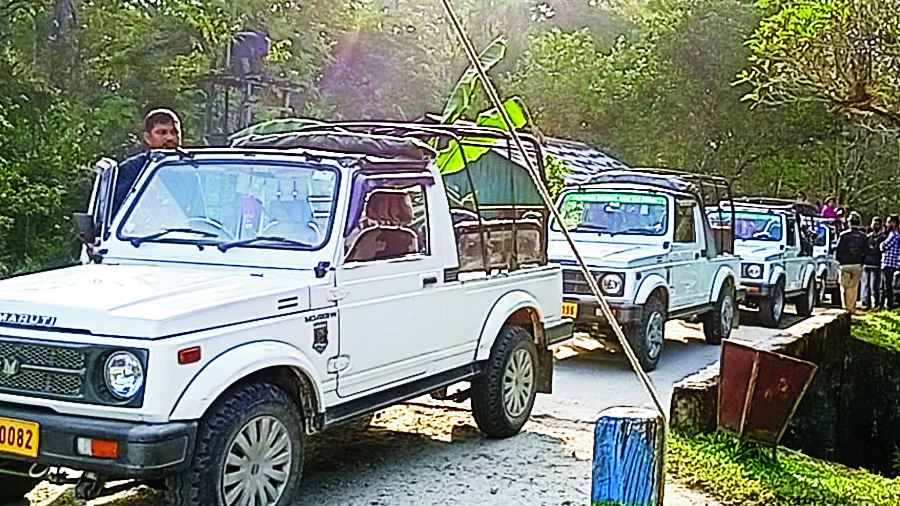The car safari in Jaldapara National Park in Alipurduar district, the largest habitat of one-horned rhinos in Bengal, came to a halt for over an hour on Monday as mahouts and patawalas or workers who arrange fodder for the pet elephants, protested for permanent jobs and a pay hike.
The protests were withdrawn after senior foresters and a representative of the state wildlife advisory board went to the spot and assured them that their demands would be taken care of in due course.
For the past three days, the mahouts and the patawalas had launched a demonstration in front of the office of the assistant wildlife warden of Jaldapara in Madarihat on these demands.
In all, there are 184 such workers in Jaldapara.
As no one from the department paid heed, they decided to launch an indefinite strike from Monday morning.
So when cars with tourists for the daily car safari reached the entrance to the national park, protesters denied them entry.
“We have been working for decades, risking our lives. But till date, all of us are temporary employees. We want the state forest department to make us permanent. Also, the salaries we receive are low compared to the job we do. The department should revise salaries,” said a senior mahout who joined the protests.
The mahouts and the patawalas take care of the pet elephants, go out on patrolling and also take tourists on elephant safari inside the forest.
According to them, mahouts receive a salary of Rs 10,000 and the patawalas Rs 7,000 as monthly salary.
“We had been protesting for three days but didn’t stop working. We took tourists on elephant safari and also fed the animals. But as no one gave importance to our protests, we decided to launch the strike from today (Monday),” the mahout added.
As news spread, the assistant wildlife warden rushed to the main entrance to Jaldapara where the tourists were stranded in their cars. He spoke with the protesters and assured them of necessary action. Range officers of different forest ranges of the national park also spoke with the mahouts and patawalas and said that their demands have been sent to higher officials.
Eventually, around 10.30am, protesters allowed the cars to enter the park.
After some time, Sourav Chakraborty, a member of the state wildlife advisory board who is based in Alipurduar, reached Jaldapara. He spoke with the protesters and urged them to withdraw the strike.
“They are the people who look after the Jaldapara National Park but nobody has taken care of them so far. Today (Monday), the state forest minister has asked me to meet them. I came here and told them that their demands have been forwarded to higher authority. Hopefully, some positive decisions would be taken in a couple of months’ time,” said Chakraborty.
The withdrawal of the protests has also relieved local stakeholders of the tourism industry.
Tourism stakeholders said that right now there was a steady inflow of tourists to Madarihat, the entry point to Jaldapara, and to some other adjoining locations.
“We were worried because if the car safari and elephant safari stop at this time, we would face cancellations from tourists. Also, it would pass a wrong message to tourists. It is good that they have withdrawn the protests,” said Biswajit Saha, who runs a resort in Madarihat.










